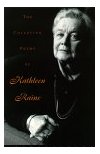|
Contents » Cover |
||
|
Essays
Kathleen Raine has always written from the timeless well of Platonism, recognizing the role of the Imagination and its highest product, Art, as the working ground of Divinity in the world. As an internationally known Blake and Yeats scholar she has delineated the principles behind the working minds and imaginations of two of the greatest Platonist poets in English. She has added, during the meantime, her own meditative poems of the natural world into the body of English poetry, making a contemporary blueprint for self-aware and energetic exploration of conscious enlightenment. Wary and weary of the codified greed behind secular materialism, she and her colleagues through the Temenos Academy continue to remind us that no matter how much we build and destroy, without soul, all is a wasteland. This book gathers poems from her many published and a number of unpublished works. At the age of ninety-four Raine chastens us to cleanse the lens of our vision, but she does it with such grace, tenderness, and absolute certainty of personal foresight as to make argument useless:
There is a poem on the way, This youthful poem finds its companion in these fragments from two late ones: "Where is the seed / Of the tree felled, / Of the forest burned, // Or living root / Under ash and cinders? // . . . Is fruit of our harvest, / Our long labour / Dust to the core?" ("Paradise Seed") "There is a place / More real than here / That is no where." ("No Where")
|
|||||
